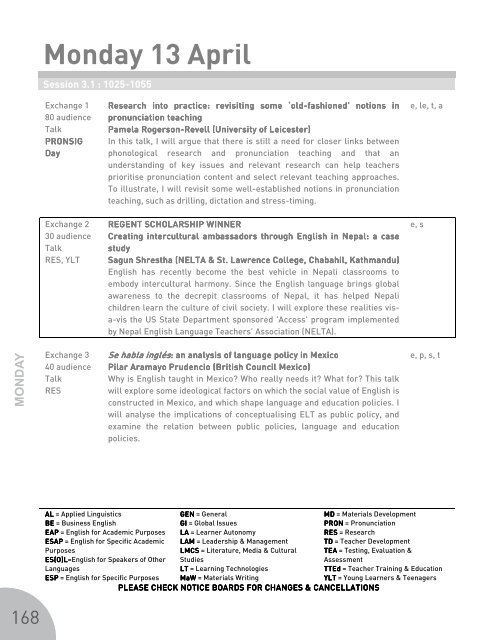You also want an ePaper? Increase the reach of your titles
YUMPU automatically turns print PDFs into web optimized ePapers that Google loves.
Monday 13 April<br />
Session 3.1 : 1025-1055<br />
Exchange 1<br />
80 audience<br />
Talk<br />
PRONSIG<br />
Day<br />
Research into practice: revisiting some ‘old-fashioned’ notions in<br />
pronunciation teaching<br />
Pamela Rogerson-Revell<br />
Revell (University of Leicester)<br />
In this talk, I will argue that there is still a need for closer links between<br />
phonological research and pronunciation teaching and that an<br />
understanding of key issues and relevant research can help teachers<br />
prioritise pronunciation content and select relevant teaching approaches.<br />
To illustrate, I will revisit some well-established notions in pronunciation<br />
teaching, such as drilling, dictation and stress-timing.<br />
e, le, t, a<br />
Exchange 2<br />
30 audience<br />
Talk<br />
RES, YLT<br />
REGENT SCHOLARSHIP WINNER<br />
Creating intercultural ambassadors through English in Nepal: a case<br />
study<br />
Sagun Shrestha (NELTA & St. Lawrence College, Chabahil, Kathmandu)<br />
English has recently become the best vehicle in Nepali classrooms to<br />
embody intercultural harmony. Since the English language brings global<br />
awareness to the decrepit classrooms of Nepal, it has helped Nepali<br />
children learn the culture of civil society. I will explore these realities visa-vis<br />
the US State Department sponsored 'Access' program implemented<br />
by Nepal English Language Teachers' Association (NELTA).<br />
e, s<br />
MONDAY<br />
Exchange 3<br />
40 audience<br />
Talk<br />
RES<br />
Se habla inglés: : an analysis of language policy in Mexico<br />
Pilar Aramayo Prudencio (British Council Mexico)<br />
Why is English taught in Mexico? Who really needs it? What for? This talk<br />
will explore some ideological factors on which the social value of English is<br />
constructed in Mexico, and which shape language and education policies. I<br />
will analyse the implications of conceptualising ELT as public policy, and<br />
examine the relation between public policies, language and education<br />
policies.<br />
e, p, s, t<br />
AL = Applied Linguistics<br />
BE = Business English<br />
EAP = English for Academic Purposes<br />
ESAP = English for Specific Academic<br />
Purposes<br />
ES(O)L=English for Speakers of Other<br />
Languages<br />
ESP = English for Specific Purposes<br />
GEN = General<br />
GI = Global Issues<br />
LA = Learner Autonomy<br />
LAM = Leadership & Management<br />
LMCS = Literature, Media & Cultural<br />
Studies<br />
LT = Learning Technologies<br />
MaW = Materials Writing<br />
MD = Materials Development<br />
PRON = Pronunciation<br />
RES = Research<br />
TD = Teacher Development<br />
TEA = Testing, Evaluation &<br />
Assessment<br />
TTEd = Teacher Training & Education<br />
YLT = Young Learners & Teenagers<br />
PLEASE CHECK NOTICE BOARDS FOR CHANGES & CANCELLATIONS<br />
168


